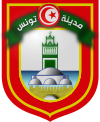Tunis
|
Tunis تونس / Tunes / ⵜⵓⵏⴻⵙ |
|||
|---|---|---|---|
| City | |||

Top left: View of Avenue Habib Bourguiba , Top middle: Ibn Khaldoun statue in Avenue Habib Bourguiba, Top right: Théâtre municipal de Tunis, 2nd left: View of Carthage district from the Punic ports, 2nd middle: "Ville nouvelle" district near Bab el Bhar, 2nd right: Tunisia Planetarium Observatories and Science Centers, 3rd left: View of Hedi Nouira avenue in Ennasr district, 3rd middle: Ezzitouna Mosque, 3rd right: Sea-front view from Sidi Bou Said district
|
|||
|
|||
| Coordinates: 36°48′N 10°11′E / 36.800°N 10.183°ECoordinates: 36°48′N 10°11′E / 36.800°N 10.183°E | |||
| Country |
|
||
| Governorate | Tunis | ||
| First settled | 2nd millennium BC | ||
| Founded by | Berbers | ||
| Government | |||
| • Mayor | Seifallah Lasram | ||
| Area | |||
| • City | 212.63 km2 (82.10 sq mi) | ||
| • Metro | 2,668 km2 (1,030 sq mi) | ||
| Highest elevation | 41 m (135 ft) | ||
| Lowest elevation | 4 m (13 ft) | ||
| Population (2014) | |||
| • City | 1 056 247 | ||
| • Density | 9,406.01/km2 (24,361.5/sq mi) | ||
| • Urban | 2 294 547 | ||
| • Metro | 2 643 695 | ||
| Demonym(s) |
Tunisois (Arabic: تونسي, Tounsi) |
||
| Time zone | CET (UTC+1) | ||
| Postal code | 1xxx, 2xxx | ||
| Calling code | 71 | ||
| ISO 3166 code | TN-11, TN-12, TN-13 and TN-14 | ||
| geoTLD | .tn | ||
| Website | Tunis City | ||
| Site of Carthage | |
|---|---|
| Name as inscribed on the World Heritage List | |
| Location | Tunisia |
| Type | Cultural |
| Criteria | ii, iii, vi |
| Reference | 37 |
| UNESCO region | Arab States |
| Inscription history | |
| Inscription | 1979 (3rd Session) |
| Medina of Tunis | |
|---|---|
| Name as inscribed on the World Heritage List | |

Roofs of the medina
|
|
| Location | Tunis, Tunisia |
| Type | Cultural |
| Criteria | ii, iii, v |
| Reference | 36 |
| UNESCO region | Arab States |
| Inscription history | |
| Inscription | 1979 (3rd Session) |
Tunis (Arabic: تونس ![]() Tūnis) is both the capital and the largest city of Tunisia. The greater metropolitan area of Tunis, often referred to as Grand Tunis, has some 2,700,000 inhabitants.
Tūnis) is both the capital and the largest city of Tunisia. The greater metropolitan area of Tunis, often referred to as Grand Tunis, has some 2,700,000 inhabitants.
Situated on a large Mediterranean Sea gulf (the Gulf of Tunis), behind the Lake of Tunis and the port of La Goulette (Ḥalq il-Wād), the city extends along the coastal plain and the hills that surround it. At its core lies its ancient medina, a World Heritage Site. Beyond this district lie the suburbs of Carthage, La Marsa, and Sidi Bou Said.
Just through the Sea Gate (also known as the Bab el Bhar and the Porte de France) begins the modern city, or Ville Nouvelle, traversed by the grand Avenue Habib Bourguiba (often referred to by popular press and travel guides as "the Tunisian Champs-Élysées"), where the colonial-era buildings provide a clear contrast to smaller, older structures. As the capital city of the country, Tunis is the focus of Tunisian political and administrative life; it is also the centre of the country's commercial activity. The expansion of the Tunisian economy in recent decades is reflected in the booming development of the outer city where one can see clearly the social challenges brought about by rapid modernization in Tunisia.
...
Wikipedia




